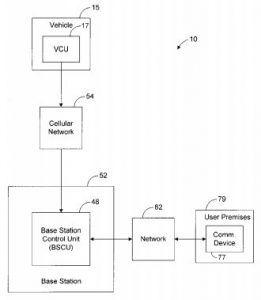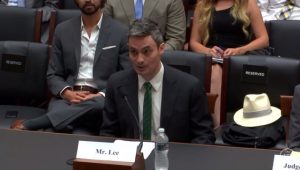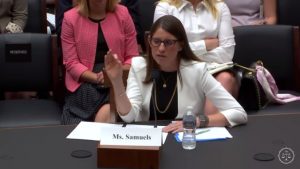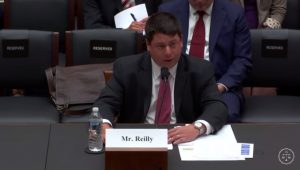On Thursday, July 13th, the House Judiciary Committee’s Subcommittee on Courts, Intellectual Property and the Internet held yet another one-sided hearing on the topic of patent reform. Although one panel witness was able to provide substantive commentary on ways to balance the current iteration of the U.S. patent system, a good deal of that day’s discussion was railroaded by meaningless puffery on “patent trolls” provided by poor panel choices.
As was the case with the June 13th House IP subcommittee hearing on the effects of the U.S. Supreme Court’s decision in TC Heartland LLC v. Kraft Foods Group Brands LLC, at least one witness sitting on the House IP subcommittee’s panel seemed to have no business being there in the first place. Tom Lee, a software engineer at geodata firm Mapbox, took time during his testimony to voice his concerns on “bad patents” and “patent trolls,” adding that it was “particularly galling to see efforts to weaken the inter partes review (IPR) system.”
Why does Mapbox’s viewpoint on patent litigation echo in the halls of Congress given the fact that it doesn’t appear that it has faced abusive patent litigation? In fact, it almost looks like there is no merit to Lee’s statement that “Mapbox has had multiple experiences with patent trolls: non-practicing entities who file meritless lawsuits that are cheaper to settle than to defend.” Mapbox certainly hasn’t had multiple experiences with lawsuits; going back to January 1st, 2000, Mapbox has been sued just once in a patent case according to data collected from Lex Machina’s legal data analytics service.
The one patent case Mapbox has faced as a defendant was filed last December by Shipping & Transit LLC, a company which itself has been very litigious against alleged patent infringement having been listed as a plaintiff in 172 patent suits. The one Shipping & Transit suit filed against Mapbox terminated in 92 days and has a total of nine docket items and the original complaint is all of six pages long. The only other significant activity on the docket is a motion to dismiss filed by Shipping & Transit this March. If, in Lee’s words, a prerequisite of being a “patent troll” is to file a lawsuit, then Mapbox hasn’t had multiple experiences with trolls, only the one.
 “The weakness of the patents used against us has often been matched by the weakness of trolls’ claims,” Lee’s testimony reads. “In some cases, the patent’s claims have had no plausible relation to our technology.” If Lee’s right about that, then it raises some serious questions over whether Mapbox even offers the kind of geodata services it advertises to potential clients. The one patent asserted by Shipping & Transit against Mapbox was U.S. Patent No. 6510383, titled Vehicular Route Optimization System and Method and issued January 2003. It claims a vehicular route optimization system having memory storing data indicating an order that a mobile vehicle is expected to arrive at a plurality of destinations, a first communications device that communicates with a remote communications device, and then a data manager interfaced with the first device and configured to analyze data in order to determine whether to accept received requests. The patent covers technology used by Shipping & Transit’s my-ASN package tracking service. Mapbox advertises an Optimization API for optimizing multi-stop travel itineraries, but somehow it doesn’t infringe on a patent covering a vehicular route optimization system for mobile vehicles arriving at multiple destinations. Shipping & Transit’s motion to dismiss noted that the patent infringement claims were being dismissed without prejudice, meaning that the claims can be reasserted if Mapbox ever does actually provide a vehicular route optimization system as it claims it does through its Optimization API.
“The weakness of the patents used against us has often been matched by the weakness of trolls’ claims,” Lee’s testimony reads. “In some cases, the patent’s claims have had no plausible relation to our technology.” If Lee’s right about that, then it raises some serious questions over whether Mapbox even offers the kind of geodata services it advertises to potential clients. The one patent asserted by Shipping & Transit against Mapbox was U.S. Patent No. 6510383, titled Vehicular Route Optimization System and Method and issued January 2003. It claims a vehicular route optimization system having memory storing data indicating an order that a mobile vehicle is expected to arrive at a plurality of destinations, a first communications device that communicates with a remote communications device, and then a data manager interfaced with the first device and configured to analyze data in order to determine whether to accept received requests. The patent covers technology used by Shipping & Transit’s my-ASN package tracking service. Mapbox advertises an Optimization API for optimizing multi-stop travel itineraries, but somehow it doesn’t infringe on a patent covering a vehicular route optimization system for mobile vehicles arriving at multiple destinations. Shipping & Transit’s motion to dismiss noted that the patent infringement claims were being dismissed without prejudice, meaning that the claims can be reasserted if Mapbox ever does actually provide a vehicular route optimization system as it claims it does through its Optimization API.
“It’s only thanks to a strongly anti-troll board and executive leadership that I’m able to be here today,” Lee’s testimony reads. It seems really questionable why Mapbox would want Lee testifying on viewpoints related to patents when he seemingly has very little knowledge of Mapbox’s own patenting activities. This is made evident by a Twitter exchange between Lee and Justin Cohen, IP litigator and partner at Thompson & Knight. Lee responded to Cohen multiple times indicating that he couldn’t be specific about Mapbox’s filing activities and that the firm doesn’t disclose details (despite the fact that such activities are publicly available information); Cohen noted that this was odd given the fact that Lee testified about Mapbox’s patent application filing activities in Congress and yet couldn’t be specific about them on Twitter.
“Patent litigation abuse is a real problem, and one that disproportionately targets the startups and small businesses that make up Engine’s community,” reads the testimony of Julie Samuels, the president of Engine. According to Engine Advocacy’s Form 990 filed with the IRS for 2015, Engine spent more than $1.3 million to develop “content to educate lawmakers and policymakers on issues including patent reform, network neutrality, and job growth.” Engine also worked to facilitate “conversations between high-tech startup founders and policymakers to discuss technological innovation and entrepreneurship.”
But who is financing the organization that purports to be acting on the behalf of tech startups? Well, Google, for one. Google lists Engine Advocacy as a third-party organization to which Google’s U.S. Public Policy and Government Affairs provides support, according to the Transparency page maintained by Google’s U.S. Public Policy team. It’s unclear exactly how much funding Google provides to Engine, but it could easily cover most of the nearly $1.49 million that Engine received in contributions and grants through 2015.
If Samuels’ testimony offered sensible viewpoints on how the U.S. patent system affects startups, for better and for worse, it would be easier to write off the involvement of Google, one of the stalwarts of the efficient infringer lobby. However, Samuels talks about software patent volume, including 40,000 new software patent grants annually, as “prohibitively daunting” and weakening the patent system as if an explosion of smartphone patents through the 2000s didn’t directly benefit the business boom for smartphones over the past decade. Samuels says that she speaks on behalf of small business startups in the tech space but, instead of encouraging startups to acquire patents as part of a risk mitigation strategy, she talks of infringement allegations being “particularly stifling to American economic growth and prosperity” and decries the “unreasonably vague terms” of patents in the high-tech and software space. None of this is to say that Samuels is lying when she talks about American economic growth, just that she may be more interested in American economic growth, which has grown to be more consolidated in the hands of relatively few tech giants in recent years, over the actual success of business startups, especially those with patents or licensing operations. It’s testimony like hers that would naturally lead Tom Lee to find engineers who consider it “an embarrassment” to be listed as an inventor on a patent.
There’s nothing particularly as galling about the testimony of Sean Reilly, senior VP and associate general counsel of the banking association The Clearing House. However, his appearance on the panel underscores a major problem with that day’s panel: Reilly is a representative of the banking industry, so of course he’s going to testify to the importance of keeping covered business method (CBM) review proceedings intact at the Patent Trial and Appeal Board (PTAB) even as he pays lip service to “the need for strong patent protection for innovations.” It’s someone with a limited understanding of patents who is having an outsized influence on the patent reform debate going on in Washington D.C. right now. Same with Tom Lee, a representative of a tech company who can’t even discuss publicly available information on his company’s patent filing activities. And Samuels, who should know better about the importance of patents to tech startups, instead talks about the problems inherent with “patent trolls” and testifies that “there is much work left to be done” in the interest of invalidating Constitutionally-protected property rights away. Judge Paul Michel’s testimony as an uninterested observer who also served as the chief patent judge in the U.S. is beyond reproach but it is worth it to note that Judge Michel is not an inventor or patent owner himself. Actual inventors and patent owners themselves are barely ever represented at these hearings.
Why are we having a hearing on “bad patents” hurting businesses when it’s abundantly clear that bad patent policy is draining innovation away from the U.S.? The strength of the U.S. patent system is currently ranked 10th, tied with Hungary. The weakening of the U.S. patent system is coming at the same time that China is strengthening patent rights domestically. The House IP subcommittee is led by someone who, by his own logic, is a patent troll and has used his political power to pressure a member of the federal judiciary to support patent-infringing interests in an ethically questionable manner. In light of this recent hearing, inventors and patent owners have every reason to continue to be discouraged by the U.S. patent system and the reform debate which continues to wreak havoc on their lives.

![[IPWatchdog Logo]](https://ipwatchdog.com/wp-content/themes/IPWatchdog%20-%202023/assets/images/temp/logo-small@2x.png)




![[Advertisement]](https://ipwatchdog.com/wp-content/uploads/2024/04/UnitedLex-May-2-2024-sidebar-700x500-1.jpg)
![[Advertisement]](https://ipwatchdog.com/wp-content/uploads/2024/04/Artificial-Intelligence-2024-REPLAY-sidebar-700x500-corrected.jpg)
![[Advertisement]](https://ipwatchdog.com/wp-content/uploads/2024/04/Patent-Litigation-Masters-2024-sidebar-700x500-1.jpg)

![[Advertisement]](https://ipwatchdog.com/wp-content/uploads/2021/12/WEBINAR-336-x-280-px.png)
![[Advertisement]](https://ipwatchdog.com/wp-content/uploads/2021/12/2021-Patent-Practice-on-Demand-recorded-Feb-2021-336-x-280.jpg)
![[Advertisement]](https://ipwatchdog.com/wp-content/uploads/2021/12/Ad-4-The-Invent-Patent-System™.png)






Join the Discussion
16 comments so far.
dh
September 23, 2017 01:36 pmThe VC banking community in the Bay Area represents a significant portion of the investor class. Their cronyism and nepotism, as a mode of operation, have become fully public.
Therefore, most VC don’t invest their managed funds in independent inventors so much as they invest in crony’s and nephews that are underwritten by other such fund managers. Therefore, they have a definite interest in removing such great risk factors as introduced by small inventors.
This regressive problem has been reflected upon since the days of Plato.
Edward Heller
August 7, 2017 12:48 pmAndrew, I would be willing pass a statute that defines a litigation abuser generally, makes it a crime, authorizes the attorney general to prosecute, and a qui tam cause of action to the public to enforce.
False marking was passed once upon a time to stop such an abuse.
Andrew Jack
August 5, 2017 05:16 pmEdward, oh yes. They just file thirty law suits against thirty defendants. Which are then consolidated, using a court management order. I am looking at Eastern District of Texas and Central district of California here. Lol! think about abuse of process. The entire change in law requiring separate law suits, is null and void because of the master case local rules. Troll jurisdictions will find a way.
Also, please look at Delaware. There are at least a few millionaire trolls who still use the $30,000 to $40,000 settlement trick. Sanctions won’t stop them unless it’s over fifty million. They will be back because they make in the millions. That’s the under belly of the industry. There are cases in some districts of Texas which should not be on the docket because the patent plaintiffs know of prior art which invalidates their patents, either because they filed cases again after they were provided with art which invalidates their patent and continued to file against other defendants.
It’s a cess pool of scum. Unfortunately, all of these trolls are making our patent system weaker. Yep, I am all for patent protection, but we need reform that gets to the heart of this issue.
Otherwise, we are going to help the folks who want to have no patents at all for some ares. Which may very well happen with the constant campaigns.
Edward Heller
August 1, 2017 02:28 pmAndrew, the day one can file against 30 defendants is over.
If in fact, the settlement demand is as you say, far below the cost of suit, the whole situation stinks of an abuse of process from the get-go. I had a situation like that myself where a plaintiff brought a class action against a class of individuals naming one individual as representing the class. Regardless of the merits of the case, I simply moved to dismiss is a violation of due process. The judge granted the motion, imposed sanctions and read the riot act to the attorneys that filed the case.
I am pretty sure most judges are willing to protect the rights of people who simply cannot defend themselves or where the cost of defense far exceeds the cost of settlement. It is simply an abuse of process; and at least the judges I have been around can see that and act accordingly.
Andrew Jack
August 1, 2017 07:51 amLol, support for the trolls? IP watchdog is a troll heaven.
Let’s see: a motion to dismiss costs $10,000 to $15,000. A month of litigation for attorneys to get up to speed costs $10,000 to $20,000. Discovery costs way more in attorneys fees.
Troll files cases against 30 defendants. Troll seeks $40,000 to $20,000.
What do you want to do? Wait for Octane fitness defense and bet $400,000 in costs? You have got to be kidding. No sensible inside counsel is going to best his job on a jury getting it right and a judge granting you sanctions after you win with the jury for every patent litigation trolls bring.
That’s economics.
Patent reform needs just a couple of things. Have the state bars enforce their ethics rules. If an attorney or his law firm owns a percentage of the llc suing thirty different people just strip their license to practice law.
Any prior art brought by either party during litigation and any claim charts as part of litigation are no longer private and must be filed with the court publicly and cannot be part of discovery not filed with a court or attorneys eyes only, even for a day. It must be filed on the docket and filed with the USPTO.
Extend the duty of candor to the USPTO to patent litigation as well.
Heck, the trolls exist because they can terrorize using the litigation process.
Edward Heller
July 31, 2017 06:11 pmGiven Octane Fitness, I would think that one should not call a patent owner who actually sues for patent infringement a troll unless one obtains a dismissal on the pleadings, or a summary judgment – unless one can demonstrate that one simply cannot afford a hire counsel to defend the lawsuit. There is something really abusive about suing people cannot defend themselves because of the cost.
Night Writer
July 30, 2017 10:37 pm>This hearing was a pathetic and reprehensible attempt to deliver a death blow to our already comatose patent system.
That sums it up nices. Anon, I am all for anything that gets 101 out of the hands of the Scotus.
Invention Rights
July 30, 2017 05:44 pmMapBox either faced rock solid patents causing a quick settlement, or they were so bad that the plaintiff immediately dropped the suit. MapBox did not file a single brief. This is supposed to be an example of bad patents harming American business? Why did the witness waste everyone’s time by failing to testify about these details? Why were they bad, and what was the harm?
And Clearing House? The asserted patents revolutionized banking. They were so good that Congress wrote and passed the Covered Business Method Review to help the banks avoid paying for the technology. Evidently, that they are so good that even CBM could not kill them off!
This hearing was a pathetic and reprehensible attempt to deliver a death blow to our already comatose patent system.
Tesia Thomas
July 30, 2017 12:47 pm@Paul Morinville,
Thanks for the info.
@Night Writer,
As always, love the outrage. 🙂
“Anyone in tech for a period of time like me (developer, product manager) has seen a million people like Samuels. They steal what others do and get into fights in design meetings.”
Yup. Worked with many people like this in my short time of working life.
The bad thing is sometimes they’re your manager.
Paul Morinville
July 30, 2017 12:05 pmTesia Thomas @1. A line generally starts to form about an hour before the hearing. It’s first come first serve, so get in line early, but anyone can go.
Night Writer
July 30, 2017 11:46 amIt is really outrageous this mentality of, gee look I was sued and, of course, I am great and my website is a great invention. The people that sued me are horrible trolls. No evidence required for any of this. All of this should be taken as the truth.
Night Writer
July 30, 2017 10:43 amBasically people like Samuels think that they should be able to do anything that they are capable of doing.
Anyone in tech for a period of time like me (developer, product manager) has seen a million people like Samuels. They steal what others do and get into fights in design meetings.
A simple question for her was whether she did a freedom to operate before building her site. I worked with one cutting edge start-up that went to the millions in revenue in only two years and they weren’t sued. Before starting their tech guy figured out what patents were out there with me that might be a problem and he figured out what they did that was new. We got patents on what was new and were careful to avoid what was out there.
You know. Real start-ups. Congress should be putting Samuels and the lowly like to a higher standard. Disgusting that a person like this could just come in and whine that she should be able to steal whatever she pleases as patents are just for trolls.
Night Writer
July 30, 2017 10:39 am>Samuels
I work with start-ups and some that have done rather well. What is disturbing about her comments is the presumption that any patent suit is invalid. Again, the question is why are you being sued? Do you have a disclosure that is before the patent priority date? Did you invent what you are doing or did you steal it?
The start-ups I have worked with haven’t had these problems. They are cutting edge people that spent the time to figure out what was out there and improve on it.
A lot of these start-ups that complain are people that use the Internet and all the websites and then sleep on it and decide they have a brilliant idea and then copy everything they saw the day before.
Start questioning these people that claim they are victims. What have you done? Where did you get the idea to do it? Why do you think their patent is invalid? Do you have disclosures before they did it?
This whole thing has turned into a clown show.
Anon
July 30, 2017 10:02 amLooking for my earlier Samuels (typo previously with the “a”), I also found this:
https://ipwatchdog.com/2013/03/07/mark-cuban-is-an-idiot-patents-do-not-impede-innovation/
Two points:
1) I was not the first to note Samuels as a mouthpiece.
2) Ron Katznelson post at 9 plays into the Fallacy being used by the Supreme Court – and the recent banter on other threads between Night Writer and I about the Supreme Court mouthing a phrase that includes “Constitutional,” but that suffers – and fatally so – from a lack of legal foundation, being all of conjectural, forward in time looking (no present case or controversy of any actual stymied innovation), and – as Ron points out – being factually inaccurate as to past attempts to use such a scare tactic.
Even if statutory law that is patent law were to be allowed to be written by the judicial branch (the meaning of common law, Night Writer), the patent law that has been attempted to be written by the Supreme Court suffers from a number of problems, including being void for vagueness**.
**You may recall the last time that we ventured into this topic, a poster identifying himself as David Boundy had an ill-fated attempt to press that the void for vagueness doctrine was somehow only valid for criminal law. I say ill-fated, because I presented facts that showed otherwise, upon which, the conversation ended.
Anon
July 30, 2017 09:50 amWhy?
Because all Issa cares about is presenting a dog and pony show to back up what he wants to do.
It’s that simple.
And it should f001 no one.
By the way, as I pointed out previously (see https://ipwatchdog.com/2017/07/18/house-ip-subcommittee-holds-one-sided-hearing-bad-patents-patent-trolls/ – comment post 6).
Julie Samuals is nothing more than a Efficient Infringer mouthpiece, having cut her teeth at EFF.
Tesia Thomas
July 30, 2017 09:11 amCan one crash a hearing?
Or is it invite only and heavily guarded?